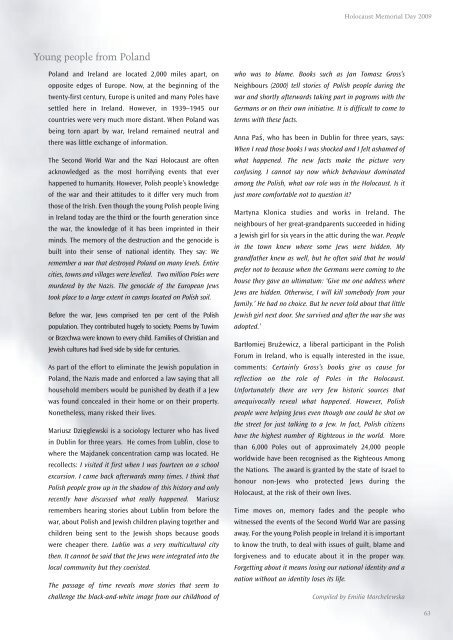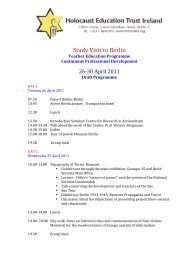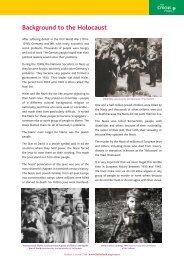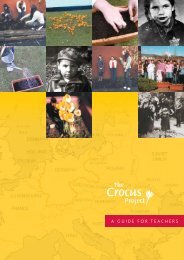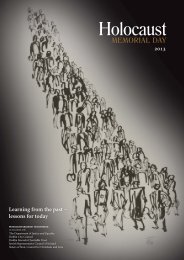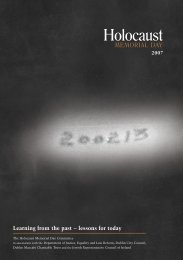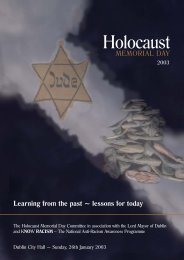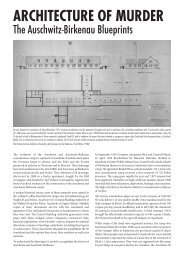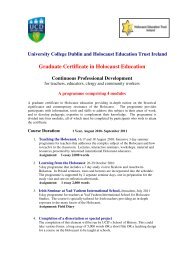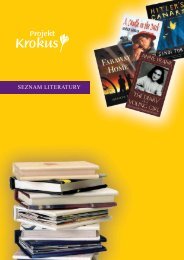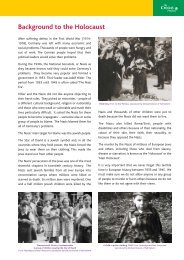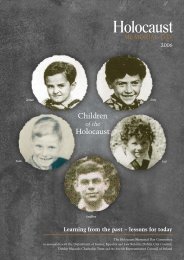Learning from the past ~ lessons for today - Holocaust Education ...
Learning from the past ~ lessons for today - Holocaust Education ...
Learning from the past ~ lessons for today - Holocaust Education ...
Create successful ePaper yourself
Turn your PDF publications into a flip-book with our unique Google optimized e-Paper software.
<strong>Holocaust</strong> Memorial Day 2009<br />
Young people <strong>from</strong> Poland<br />
Poland and Ireland are located 2,000 miles apart, on<br />
opposite edges of Europe. Now, at <strong>the</strong> beginning of <strong>the</strong><br />
twenty-first century, Europe is united and many Poles have<br />
settled here in Ireland. However, in 1939–1945 our<br />
countries were very much more distant. When Poland was<br />
being torn apart by war, Ireland remained neutral and<br />
<strong>the</strong>re was little exchange of in<strong>for</strong>mation.<br />
The Second World War and <strong>the</strong> Nazi <strong>Holocaust</strong> are often<br />
acknowledged as <strong>the</strong> most horrifying events that ever<br />
happened to humanity. However, Polish people’s knowledge<br />
of <strong>the</strong> war and <strong>the</strong>ir attitudes to it differ very much <strong>from</strong><br />
those of <strong>the</strong> Irish. Even though <strong>the</strong> young Polish people living<br />
in Ireland <strong>today</strong> are <strong>the</strong> third or <strong>the</strong> fourth generation since<br />
<strong>the</strong> war, <strong>the</strong> knowledge of it has been imprinted in <strong>the</strong>ir<br />
minds. The memory of <strong>the</strong> destruction and <strong>the</strong> genocide is<br />
built into <strong>the</strong>ir sense of national identity. They say: We<br />
remember a war that destroyed Poland on many levels. Entire<br />
cities, towns and villages were levelled. Two million Poles were<br />
murdered by <strong>the</strong> Nazis. The genocide of <strong>the</strong> European Jews<br />
took place to a large extent in camps located on Polish soil.<br />
Be<strong>for</strong>e <strong>the</strong> war, Jews comprised ten per cent of <strong>the</strong> Polish<br />
population. They contributed hugely to society. Poems by Tuwim<br />
or Brzechwa were known to every child. Families of Christian and<br />
Jewish cultures had lived side by side <strong>for</strong> centuries.<br />
As part of <strong>the</strong> ef<strong>for</strong>t to eliminate <strong>the</strong> Jewish population in<br />
Poland, <strong>the</strong> Nazis made and en<strong>for</strong>ced a law saying that all<br />
household members would be punished by death if a Jew<br />
was found concealed in <strong>the</strong>ir home or on <strong>the</strong>ir property.<br />
None<strong>the</strong>less, many risked <strong>the</strong>ir lives.<br />
Mariusz Dzięglewski is a sociology lecturer who has lived<br />
in Dublin <strong>for</strong> three years. He comes <strong>from</strong> Lublin, close to<br />
where <strong>the</strong> Majdanek concentration camp was located. He<br />
recollects: I visited it first when I was fourteen on a school<br />
excursion. I came back afterwards many times. I think that<br />
Polish people grow up in <strong>the</strong> shadow of this history and only<br />
recently have discussed what really happened. Mariusz<br />
remembers hearing stories about Lublin <strong>from</strong> be<strong>for</strong>e <strong>the</strong><br />
war, about Polish and Jewish children playing toge<strong>the</strong>r and<br />
children being sent to <strong>the</strong> Jewish shops because goods<br />
were cheaper <strong>the</strong>re. Lublin was a very multicultural city<br />
<strong>the</strong>n. It cannot be said that <strong>the</strong> Jews were integrated into <strong>the</strong><br />
local community but <strong>the</strong>y coexisted.<br />
The passage of time reveals more stories that seem to<br />
challenge <strong>the</strong> black-and-white image <strong>from</strong> our childhood of<br />
who was to blame. Books such as Jan Tomasz Gross’s<br />
Neighbours (2000) tell stories of Polish people during <strong>the</strong><br />
war and shortly afterwards taking part in pogroms with <strong>the</strong><br />
Germans or on <strong>the</strong>ir own initiative. It is difficult to come to<br />
terms with <strong>the</strong>se facts.<br />
Anna Paś, who has been in Dublin <strong>for</strong> three years, says:<br />
When I read those books I was shocked and I felt ashamed of<br />
what happened. The new facts make <strong>the</strong> picture very<br />
confusing. I cannot say now which behaviour dominated<br />
among <strong>the</strong> Polish, what our role was in <strong>the</strong> <strong>Holocaust</strong>. Is it<br />
just more com<strong>for</strong>table not to question it?<br />
Martyna Klonica studies and works in Ireland. The<br />
neighbours of her great-grandparents succeeded in hiding<br />
a Jewish girl <strong>for</strong> six years in <strong>the</strong> attic during <strong>the</strong> war. People<br />
in <strong>the</strong> town knew where some Jews were hidden. My<br />
grandfa<strong>the</strong>r knew as well, but he often said that he would<br />
prefer not to because when <strong>the</strong> Germans were coming to <strong>the</strong><br />
house <strong>the</strong>y gave an ultimatum: ‘Give me one address where<br />
Jews are hidden. O<strong>the</strong>rwise, I will kill somebody <strong>from</strong> your<br />
family.’ He had no choice. But he never told about that little<br />
Jewish girl next door. She survived and after <strong>the</strong> war she was<br />
adopted.’<br />
Bartłomiej Brużewicz, a liberal participant in <strong>the</strong> Polish<br />
Forum in Ireland, who is equally interested in <strong>the</strong> issue,<br />
comments: Certainly Gross’s books give us cause <strong>for</strong><br />
reflection on <strong>the</strong> role of Poles in <strong>the</strong> <strong>Holocaust</strong>.<br />
Un<strong>for</strong>tunately <strong>the</strong>re are very few historic sources that<br />
unequivocally reveal what happened. However, Polish<br />
people were helping Jews even though one could be shot on<br />
<strong>the</strong> street <strong>for</strong> just talking to a Jew. In fact, Polish citizens<br />
have <strong>the</strong> highest number of Righteous in <strong>the</strong> world. More<br />
than 6,000 Poles out of approximately 24,000 people<br />
worldwide have been recognised as <strong>the</strong> Righteous Among<br />
<strong>the</strong> Nations. The award is granted by <strong>the</strong> state of Israel to<br />
honour non-Jews who protected Jews during <strong>the</strong><br />
<strong>Holocaust</strong>, at <strong>the</strong> risk of <strong>the</strong>ir own lives.<br />
Time moves on, memory fades and <strong>the</strong> people who<br />
witnessed <strong>the</strong> events of <strong>the</strong> Second World War are passing<br />
away. For <strong>the</strong> young Polish people in Ireland it is important<br />
to know <strong>the</strong> truth, to deal with issues of guilt, blame and<br />
<strong>for</strong>giveness and to educate about it in <strong>the</strong> proper way.<br />
Forgetting about it means losing our national identity and a<br />
nation without an identity loses its life.<br />
Compiled by Emilia Marchelewska<br />
63


